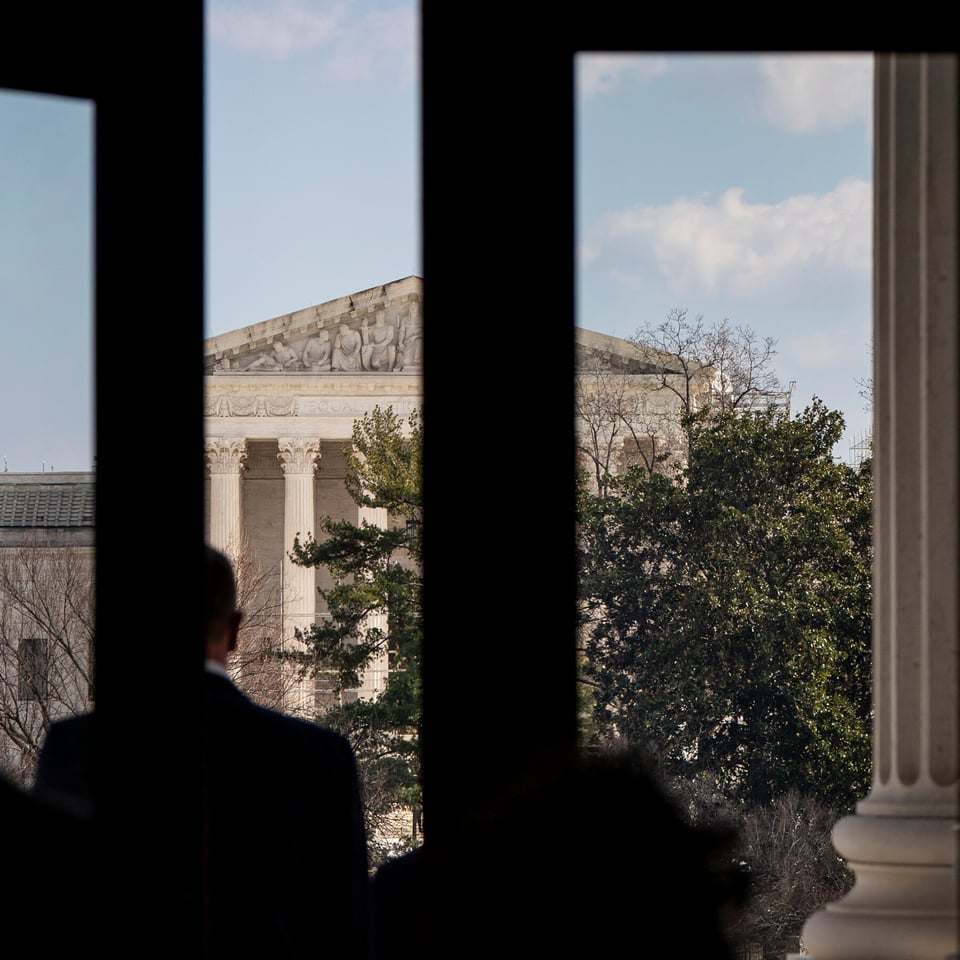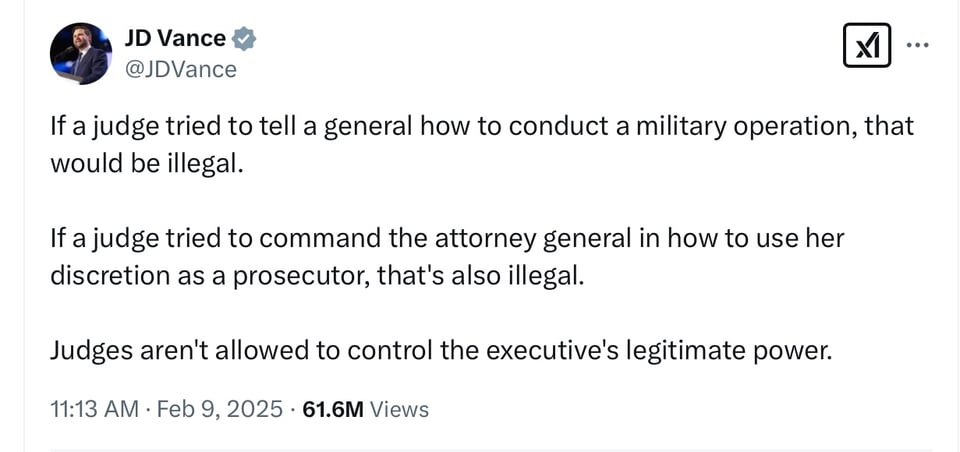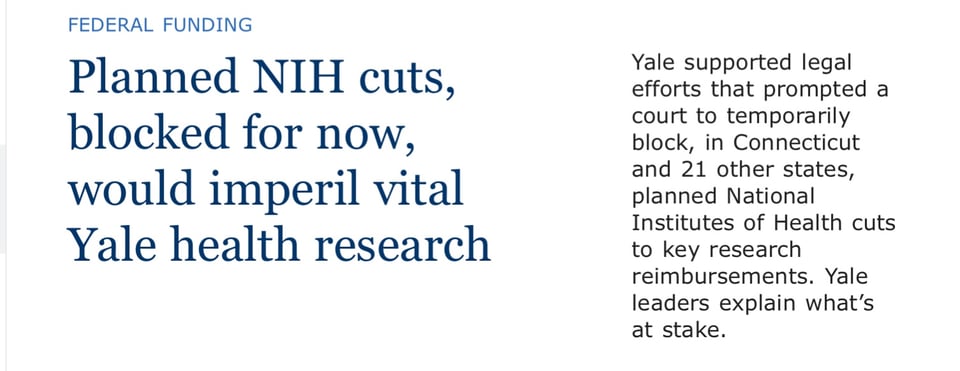Wednesday, February 12, 2025. Annette’s News Roundup.
What can be done about Trump’s increasing lawlessness.
1. Trump Lawlessness by ignoring the Constitution and the Courts.
The United States is sleepwalking into a constitutional crisis. Not only has the Trump administration seized for itself extraconstitutional powers, but yesterday, it raised the specter that, should the courts apply the text of the Constitution and negate its plans, it will simply ignore them.
The Spanish political scientist Juan Linz once theorized that presidential systems are more likely than parliamentary systems to undergo constitutional crises or coup attempts, because they create dueling centers of power. The president and Congress both enjoy popular elections, creating a clash of popular mandates when opposing parties win simultaneous control. “Who has the stronger claim to speak on behalf of the people,” Linz asked, “the president or the legislative majority that opposes his policies?” Presidential systems would teeter and fall, he argued, when the president and Congress could not resolve their competing claims to legitimacy.
A dozen years ago, when Republicans in Congress presented their majorities as having negated Barack Obama’s electoral mandate and began threatening to precipitate a debt crisis to force him to accept their domestic economic plan, Linz’s ideas began attracting renewed attention among liberal intellectuals. And indeed, the system is teetering. But the source of the emergency is nearly the opposite of what Linz predicted. The Trump administration is not refusing to share power with an opposing party. It is refusing to follow the constitutional limits of a government that its own party controls completely.
Donald Trump is unilaterally declaring the right to ignore spending levels set by Congress, and to eliminate agencies that Congress voted to create. What makes this demand so astonishing is that Trump could persuade Congress, which he commands in personality-cult style, to follow his demands. Republicans presently control both houses of Congress, and any agency that Congress established, it can also cut or eliminate.
Yet Trump refuses to even try to pass his plan democratically. And as courts have stepped in to halt his efforts to ignore the law, he is now threatening to ignore them too. “If a judge tried to tell a general how to conduct a military operation, that would be illegal,” Vice President J. D. Vance posted on X yesterday morning. “If a judge tried to command the attorney general in how to use her discretion as a prosecutor, that’s also illegal. Judges aren’t allowed to control the executive’s legitimate power.”
Now, Vance was not quite making an unconditional vow to ignore a court order. Rather, he was stepping right up to the line. Obviously, judges aren’t allowed to control the executive’s legitimate power, but determining whether orders are legitimate is the very question the courts must decide.
Elon Musk has described one judge who issued an unfavorable ruling as “corrupt”—using the word in the Trumpian sense, not to describe flouting ethics rules or profiting from office, but rather to mean “opposed to Trump”—and demanded his impeachment. Trump told reporters, “No judge should frankly be allowed to make that kind of a decision; it’s a disgrace.”
Vance proposed in 2021 that Republicans, when they regain power, should replace the entire federal bureaucracy with political loyalists, and be prepared to refuse court rulings against such a clearly illegal act. “And when the courts—because you will get taken to court—and when the courts stop you,” he urged, “stand before the country like Andrew Jackson did and say: ‘The chief justice has made his ruling. Now let him enforce it.’” So Vance has already reached the mental threshold of defying a court order. The question is whether he will see any of the current battles as presenting the right opportunity to take this step, and whether he will prevail on Trump (and, realistically, Musk) to do so.
Just as Trump and Musk are refusing to submit their plans to a Congress that their party controls, they are at least toying with the notion of ignoring orders by a court they have shaped. The Supreme Court, which has final word on all constitutional disputes, has a two-to-one majority of Republican appointees. When Vance floated the idea of defying the courts in 2021, he was anticipating his party taking actions so indisputably illegal that not even friendly justices would swallow them. They are prepared to smash a system they control, simply because it won’t move at the frantic pace they demand.
Will Trump actually go as far as he, Vance, and Musk have suggested? The notion that they would so early in their term escalate to the highest level of constitutional crisis short of canceling elections seems difficult to believe. Quite possibly, cooler heads will prevail.
The trouble is that the Republican Party’s cooler heads have been on a losing streak since November. Trump has appointed some of his most radical, unhinged, and unqualified followers to the Cabinet, and—with the sole exception of Matt Gaetz, whose attorney-general nomination failed because he’d alienated so many fellow Republicans in Congress—they are sailing through. Trump freed all the January 6 insurrectionists, and has begun firing and investigating the people in law enforcement who investigated the insurrection.
Trump appointed a former January 6 lawyer, Ed Martin, as U.S. attorney for the District for Columbia. Martin has presented himself in public as a kind of concierge lawyer for Trump and Musk, promising them special protection. “If people are discovered to have broken the law,” he wrote to Musk, “or even acted simply unethically, we will investigate them and we will chase them to the end of the Earth to hold them accountable.” The chief law-enforcement officer in the nation’s capital is stating in writing that he will investigate people for actions that he does not believe violated the law, but merely violated his own ethical sensibility, a rather frightening prospect.
Just this weekend, The Washington Post reported that the administration is asking candidates for national-security and law-enforcement positions to answer questions such as “Who were the ‘real patriots’ on Jan. 6? Who won the 2020 election?” and declining to offer jobs to those who fail to supply MAGA answers. Trump has sanctified the insurrection, has criminalized the prosecution of even its most violent activities, and is screening out anybody willing to question his belief that he is entitled to absolute power.
If you had predicted things like this before the election, most Republicans would have accused you of Trump derangement syndrome. Yet Republicans have barely uttered a peep of protest in the face of these actions.
Given his party’s near-total acquiescence in every previous step toward authoritarianism, perhaps Trump would not have to be crazy to take the next one. The entire administration is intoxicated with power. The crisis lies not in the structure of government so much as in the character of the party that runs it, which refuses to accept the idea that its defeat is ever legitimate or that its power has any limits. (Jonathan Chait, The Atlantic).
This post👇 gives an historical overview of Executive branch violations of court rulings.
Trump’s Actions Have Created a Constitutional Crisis, Scholars Say.
Law professors have long debated what the term means. But now many have concluded that the nation faces a reckoning as President Trump tests the boundaries of executive power.

There is no universally accepted definition of a constitutional crisis, but legal scholars agree about some of its characteristics. It is generally the product of presidential defiance of laws and judicial rulings. It is not binary: It is a slope, not a switch. It can be cumulative, and once one starts, it can get much worse.
It can also be obvious, said Erwin Chemerinsky, dean of the law school at the University of California, Berkeley.
“We are in the midst of a constitutional crisis right now,” he said on Friday. “There have been so many unconstitutional and illegal actions in the first 18 days of the Trump presidency. We never have seen anything like this.”
He ticked off examples of what he called President Trump’s lawless conduct: revoking birthright citizenship, freezing federal spending, shutting down an agency, removing leaders of other agencies, firing government employees subject to civil service protections and threatening to deport people based on their political views.
That is a partial list, Professor Chemerinsky said, and it grows by the day. “Systematic unconstitutional and illegal acts create a constitutional crisis,” he said.
The distinctive feature of the current situation, several legal scholars said, is its chaotic flood of activity that collectively amounts to a radically new conception of presidential power. But the volume and speed of those actions may overwhelm and thus thwart sober and measured judicial consideration.
It will take some time, though perhaps only weeks, for a challenge to one of Mr. Trump’s actions to reach the Supreme Court. On Monday, a federal judge said the White House had defied his order to release billions of dollars in federal grants, marking the first time a judge has expressly declared that the Trump administration is disobeying a judicial mandate.
It remains to be seen whether Mr. Trump would defy a ruling against him by the justices.
“It’s an open question whether the administration will be as contemptuous of courts as it has been of Congress and the Constitution,” said Kate Shaw, a law professor at the University of Pennsylvania. “At least so far, it hasn’t been.”
That could change. On Sunday, Vice President JD Vance struck a confrontational tone on social media. “Judges aren’t allowed to control the executive’s legitimate power.”

Professor Shaw said a clash with the courts would only add to a crisis that is already underway. “A number of the new administration’s executive orders and other executive actions are in clear violation of laws enacted by Congress,” she said.
“The administration’s early moves,” she added, “also seem designed to demonstrate maximum contempt for core constitutional values — the separation of powers, the freedom of speech, equal justice under law.”
Pamela Karlan, a law professor at Stanford, added that a crisis need not arise from clashes between the branches of the federal government.
“It’s a constitutional crisis when the president of the United States doesn’t care what the Constitution says regardless whether Congress or the courts resist a particular unconstitutional action,” she said. “Up until now, while presidents might engage in particular acts that were unconstitutional, I never had the sense that there was a president for whom the Constitution was essentially meaningless.”
The courts, in any event, may not be inclined or equipped to push back. So much is happening, and so fast, that even eventual final rulings from the Supreme Court rejecting Mr. Trump’s arguments could come too late. After the U.S. Agency for International Development or the Consumer Financial Protection Bureau are disassembled, say, no court decision can recreate them.
In many cases, of course, the Supreme Court’s six-member conservative majority may be receptive to Mr. Trump’s arguments. Its decision in July granting him substantial immunity from prosecution embraced an expansive vision of the presidency that can only have emboldened him.
Members of that majority are, for instance, likely to embrace the president’s position that he is free to fire leaders of independent agencies.
The court may nonetheless issue an early, splashy ruling against Mr. Trump to send a signal about its power and independence. Striking down Mr. Trump’s order directing officials to deny citizenship to the children of immigrants would seem to be a good candidate, as it is at odds with the conventional understanding of the Constitution and the court’s precedents.
Such a decision would have an added benefit: It would be hard to disobey. From its earliest days, the Supreme Court has been wary of issuing rulings that might be ignored.
“I’m reminded of Marbury v. Madison, when the government did not even bother to show up before the Supreme Court to defend its position — strongly suggesting it would flout any court order against it,” said Amanda Frost, a law professor at the University of Virginia.
Even as the court ruled that the administration of Thomas Jefferson had acted unlawfully, she said, “the court carefully crafted its opinion in that case to avoid a ruling requiring executive branch compliance.”
Much has changed since that 1803 decision, and the Supreme Court’s stature and authority have grown. “Nonetheless,” Professor Frost said, “the Supreme Court may find it hard to defend the laws Congress enacted against executive usurpation when the Republican-controlled Congress refuses to do the same.”
Professor Karlan said she worried that the justices would rule for Mr. Trump for fear that he would ignore decisions rejecting his positions. “The idea that courts should preserve the illusion of power by abdicating their responsibilities would just make the constitutional crisis even worse,” she said.
Mr. Trump has already disregarded one Supreme Court decision, its ruling last month upholding a federal law, passed by lopsided bipartisan majorities, requiring TikTok to be sold or banned. Mr. Trump instead ordered the Justice Department not to enforce the law for 75 days, citing as authority for the move his “unique constitutional responsibility for the national security of the United States.”

President Dwight D. Eisenhower sent the 101st Airborne Division to Little Rock, Ark., in 1957 to enforce Brown v. Board of Education, a Supreme Court decision in 1954 that banned segregation in public schools.
Defiance of Supreme Court decisions is not unheard-of. Southern states, for instance, for years refused to follow Brown v. Board of Education, the 1954 decision that banned segregation in public schools, engaging in what came to be known as “massive resistance.”
The Brown decision is now almost universally viewed as a towering achievement. But its enforcement required President Dwight D. Eisenhower to decide to send members of the 101st Airborne Division to Little Rock, Ark., to escort Black students through an angry white mob.
Not all presidents gave the court’s rulings the same respect. In 1832, President Andrew Jackson refused to enforce a Supreme Court decision arising from a clash between Georgia and the Cherokee Nation. A probably apocryphal but nonetheless potent comment is often attributed to Jackson about Chief Justice John Marshall: “John Marshall has made his decision; now let him enforce it.”
Even before this weekend, Mr. Vance has said that Mr. Trump should ignore the Supreme Court. In a 2021 interview, he said Mr. Trump should “fire every single midlevel bureaucrat, every civil servant in the administrative state” and “replace them with our people.”
He added: “When the courts stop you, stand before the country like Andrew Jackson did and say, ‘The chief justice has made his ruling. Now let him enforce it.’”
Chief Justice John G. Roberts Jr. took note of such threats in his year-end report in December.
“Every administration suffers defeats in the court system — sometimes in cases with major ramifications for executive or legislative power or other consequential topics,” he wrote. “Nevertheless, for the past several decades, the decisions of the courts, popular or not, have been followed, and the nation has avoided the standoffs that plagued the 1950s and 1960s.”
“Within the past few years, however,” the chief justice went on, “elected officials from across the political spectrum have raised the specter of open disregard for federal court rulings. These dangerous suggestions, however sporadic, must be soundly rejected.”
That view has many supporters, though some use caveats. “It would be an extremely grave matter for a president to defy an actual (unstayed, in-effect) order of a federal court in a case that is indisputably in the court’s jurisdiction,” Ed Whelan, a conservative legal commentator, wrote on social media.
But considering discrete clashes may be relying on an outdated paradigm.
“One way to look at the administration’s assault on legal barriers is that it is seeking to establish ‘test cases’ to litigate and win favorable Supreme Court decisions,” Bob Bauer and Jack Goldsmith wrote in their Executive Functions newsletter. “But the typical test case is a carefully developed, discrete challenge to statutory or judge-made law with some good faith basis.”
Mr. Goldsmith is a law professor at Harvard and a former Justice Department official in the George W. Bush administration. Mr. Bauer was White House counsel for President Barack Obama. They are students of Article II of the Constitution, which sets out the powers of the president.
Mr. Trump’s executive orders have some features suggesting that they mean to test legal theories in the Supreme Court, they wrote. “But in the aggregate,” they added, “they seem more like pieces of a program, in the form of law defiance, for a mini-constitutional convention to ‘amend’ Article II across a broad front.” (New York Times).
Meet the Litigation Tracker.
It keeps you up to date on all legal action against Trump and his administration. Click here.Litigation Tracker: Legal Challenges to Trump Administration Actions
2. Trump Lawlessness by ignoring national sovereignty.
Trump goes over any line of international law. 👇
Watch both videos.👇
While meeting with the King of Jordan and a visibly uncomfortable Rubio today, Trump now changes his position from yesterday and says the US is not going to buy Gaza, we are just going to take it: “We’re gonna take it, we’re gonna hold it, we’re gonna cherish it.” pic.twitter.com/5MgH7YHMoW
— Ron Filipkowski (@RonFilipkowski) February 11, 2025
BREAKING: During a press conference just now with King Abdullah of Jordan, Trump was asked under what authority the U.S. would take Gaza.
— Brian Krassenstein (@krassenstein) February 11, 2025
His ignorant response: “Under the U.S. authority.” pic.twitter.com/6uZNrayci8
Watch King Abdullah of Jordan answer. 👇
Hear this Trump & Netanyahu
— Jerry Hicks (@JerryHicksUnite) February 11, 2025
King Abdullah of Jordan couldn’t be clearer:
"We will never accept the forced displacement of Palestinians which is a war crime" pic.twitter.com/Uz98uckByy#Jordan #Trump #Gaza #Palestine #Israel
Similarly, the President of Mexico rejected Trump’s demand to take over the Gulf of Mexico. The Prime Minister of Denmark rejected his demand to take over Greenland. And, of course, the Prime Minister of Canada rejected his demand that our Northern neighbor become our 51st State.
But so far there is no international body stopping him, nor is there international outrage.
The question about Trump that causes me to lose sleep.

I saw this yesterday 👆 from one of our major medical and scientific research centers. I gasped.
Why is Trump stopping payments, say, to medical research? He is not a small government kind of guy. He doesn’t care about this issue. It’s not a crowd-pleaser for his cult, like race or immigration.
Today’s bullying against Egypt and Jordan, - Today’s threat to stop aid from America, that has a clear motive.
He wants to make money by turning Gaza into a “real estate development project” (his phrase).
If Egypt and Jordan don’t do what he demands, he can’t make the money by turning Gaza into his imagined “Riviera of the Middle East”(his stated hope, dream and intention).
He hates being refused. He won’t accept it. He expects to be obeyed. All powerful Trump. We bow.
When anyone resists his orders, he demands obedience even more.
But Trump doesn’t care about small government. Or whether the government is a source of money for scientific research.
Why is he making these extreme and dangerous budget cuts?
But what caused this? What is the motive?
Is he just handed orders from Project 2025 that he stupidly and casually executes? Have they promised him cutting the government will make him popular?
Our problem is once he makes a demand, the die is cast. It is very difficult to get him to change his mind.
The question remains. Why does he make a demand like cut medical research?
I don’t get it. If you do, please tell me the answer. Maybe we can save the world.
For now, and first, we count on Judges, though Trump may not obey them. (Annette Niemtzow)
One more thing.
🚨NEW: Federal Judge Angel Kelley has blocked the Trump Administration from cutting National Institute of Health grants to hospitals, universities, and non-profit organizations for medical research.
— Protect Kamala Harris ✊ (@DisavowTrump20) February 10, 2025
RETWEET to thank Judge Kelley! pic.twitter.com/qclD0akus0
[Further]Judge Kelley ordered the NIH to issue a status report within 24 hours – then at bi-weekly intervals – to confirm “the regular disbursement and obligation of federal financial assistance funds.”
A hearing to evaluate next steps has been set for Feb. 21.(ABC News)
Resistance. 🤞
So far, Republican Jerry Moran of Kansas. Now this.
BREAKING: Republican Congressman Gary Palmer just slammed his Republican colleagues for not having the courage to stand up to Donald Trump and remind Trump he has to work with Congress. This is huge. pic.twitter.com/NWIDpStsLc
— Democratic Wins Media (@DemocraticWins) February 10, 2025